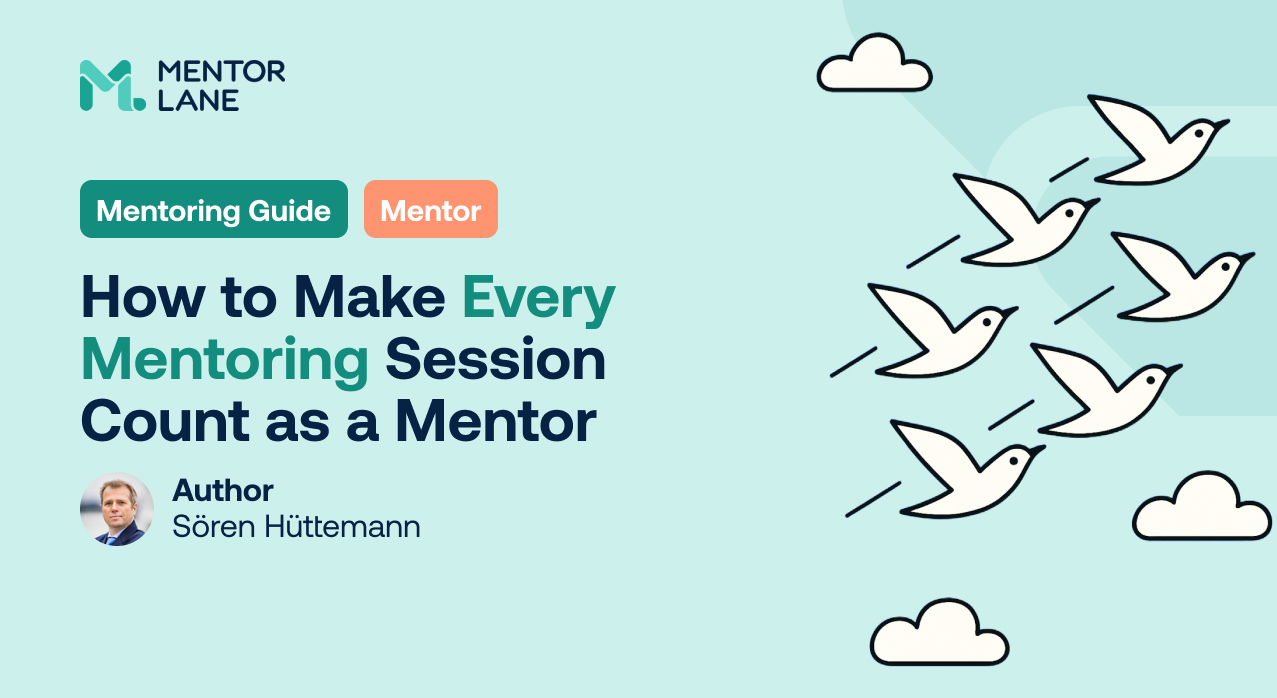News & Updates
22 Aug 08:38
5 min read
How to Make Every Mentoring Session Count as a Mentor
Transform your mentoring sessions from casual chats to impactful guidance. Learn how preparation, structure, and reflection can make every meeting meaningful for you and your mentee.

Courtney Ellis
Media Manager

Run An Exceptional Mentoring Session Every Time
Download Here - How to Get the Most from Every Mentoring Session-Guide For Mentors.pdf
You're already doing something amazing by committing to mentor someone.
You're stepping into one of the most rewarding roles possible by shaping someone's career and potentially changing their life trajectory.
But how do you keep the momentum going? How do you make every session feel energising, motivating, and keep your mentee on track? Below, we'll outline a few very important techniques to keep each mentoring session just like the first one: exciting, inspiring, and impactful.
We're going to walk you through:
- How to prepare for each mentoring session as a mentor by asking yourself a series of essential preparation questions.
- How to structure an agenda for each mentoring session.
- The benefits of keeping a learning diary so that you can track both your and your mentee's personal growth.
This will help you deliver impactful sessions every time and track if the mentoring relationship has been mutually impactful on your professional journeys.
When Close the Gap Foundation transitioned from unstructured to structured mentorship, their mentee retention increased by 64%.
Having a plan wins over intuition every time.
Pillar One: Preparation Questions
Before each session, you need to answer five critical questions that transform your mindset from casual advisor to strategic partner.
- What topics have been discussed so far? What were the most important findings and agreements?
This question forces you to maintain continuity. You're building on previous conversations, not starting fresh each time.
- What has happened since the last session, and what does this mean for the upcoming session?
Context shapes everything. Your mentee's recent experiences, challenges, and wins directly influence what they need from you today.
- What do I want to address in the session?
You set the agenda. This isn't about controlling the conversation but ensuring you cover the most important ground.
- What do I want to achieve in the session?
Every interaction needs a clear outcome. Vague sessions produce vague results.
- What do I want to try after the session?
This question shifts responsibility to you as the mentor. You're not just dispensing advice; you're committing to follow-up actions, resources, and support.
Intensive preparation allows for more time to be devoted to actual mentoring. You can prepare relevant literature, gather specific resources, and create mini-plans while insights are fresh in your mind.
Those "mini brain waves" disappear quickly. The brilliant resource you thought of during conversation vanishes if you don't capture it immediately.
Pillar Two: Structured Session Agendas
Structure allows consistency and trust to form between parties. Your mentee can relax and have breakthrough moments when they're not worried about what happens next.
The plan is already established each week.
Opening and Atmosphere (10 minutes)
Brief personal assessment: How is your mentee doing? What's happened since your last session?
Review Previous Session (10 minutes)
Summary of key points and actions from the last meeting. This creates accountability and continuity.
Main Discussion Topics (30 minutes)
Address specific skills the mentee wants to improve. Collect solutions and strategies for problem areas. This is where the real work happens.
Goal Setting and Action Planning (20 minutes)
Develop action plans with specific, measurable steps. Define short-term and long-term goals or discuss achievement progress.
Feedback and Reflection (10 minutes)
Consider what went well and what could be improved. Ask for feedback on the session itself.
Conclusion and Next Steps (10 minutes)
Summarise key findings. Confirm actions and deadlines. Set the next appointment.
Structure creates dependability and trust. When mentees feel structurally safe, they share more genuine struggles. You can identify their issues faster and better tailor your mentoring approach.
Psychological safety through predictability unlocks deeper insights.
Pillar Three: Learning Diaries
Mentoring is like a mirror, it reflects back what you're giving in your mentee. To make the best of that reflection, you need to look deeper and see what you can offer better next time.
After each mentoring session, both you and your mentee should answer five reflection questions in a separate notebook.
- The most important work we did today:
This captures the session's core value and ensures nothing critical gets lost.
- The most valuable lesson:
Sometimes the biggest insight isn't what you planned to teach.
- How will I apply what I have learned?
Learning without application is just entertainment. This question forces practical implementation.
- What are the biggest challenges that lie ahead for me?
This puts you in a vulnerable position as the mentor. You're admitting your own growth areas and development needs.
- What questions remain unanswered for me?
Curiosity drives continued learning. Unanswered questions become research projects and future conversation topics.
The learning diary transforms mentorship from one-way advice-giving to mutual development. Research shows that reflective diaries create dual value for both mentor and mentee development by embedding evaluation within the learning process.
Implementing These Pillars in Your Next Mentoring Sessions
Start with one pillar. Choose preparation questions for your next three mentoring sessions. Notice how the quality of your conversations changes when you arrive with clear intentions and specific outcomes.
Then add structured agendas. Your mentees will immediately feel the difference between purposeful guidance and casual conversation.
Finally, implement learning diaries. This is where the compound effect begins. Both you and your mentee develop faster when insights are captured and reviewed systematically.
Creating Lasting Change
Your mentees deserve more than good intentions and casual advice. They need structured support that creates measurable outcomes.
The three pillars provide that structure.
- Preparation questions ensure you arrive ready.
- Structured agendas create psychological safety.
- Learning diaries capture insights and drive continuous improvement.
Good intentions only lead to change through action. Your next mentoring session is an opportunity to implement these pillars. Your mentee's career growth depends on the structure you provide.
Start with preparation. Build the agenda. Capture the insights.
Let’s transform casual advice into true career-changing mentorship. Keep mentoring!

This post is also available in:
Related Posts
Sales Mentors: A 9-Round Guide to Sales Success with Michael Silberberger
Discover Michael’s 9-round guide to sales success. Learn how sales mentors help you build confidence, resilience, and lasting results.
What to Expect from a Mentor: What My Millionaire Mentor Taught Me
Curious what a millionaire mentor actually teaches? It's not about money tricks, it's mindset. Discover the surprising lessons that transformed Michael's approach to success and life.
How To Become a Mentor in Germany
Ever thought about becoming a mentor? Click here to work out if you're ready to become a mentor, and the steps to take to become a mentor in Germany.



-cd972d86.png)
